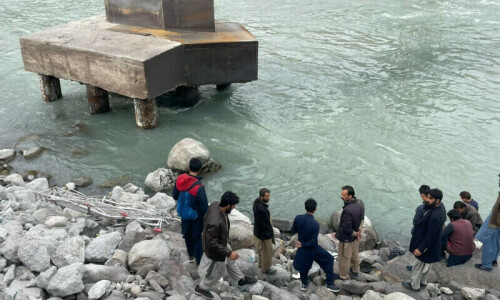PESHAWAR: There has been a steady increase in the cases of what members of the Khyber Pakhtunkhwa Assembly deem privilege motions even though the nature of most of them hardly falls under the definition mentioned in the Provincial Assembly (Powers, Immunities and Privileges) Act, 1988.
Far from it, the ‘privilege motions’ routinely raised in the assembly — taking up much time and effort on part of MPAs and Speaker — are just complaints of petty nature propelled by personal egos than genuine instances of hindrance to parliamentary duties and business.
The powers and privileges of MPAs defined in the act are very broad and can be interpreted in any number of ways given their wide scope.
The confusion is further intensified when one considers the fact that the definition of ‘privilege motion’ as mentioned in the Act is not included in the Khyber Pakhtunkhwa Procedures and Conduct of Business Rules, 1988 – the go-to document on conducting affairs of the assembly.
Deputy speaker says members shouldn’t bring ordinary complaints to house
Some of the privilege motions referred to the relevant committee in recent months are both comical and trivial. For instance, a sitting lawmaker of the opposition moved privilege motion against manager of a private bank.
The mover said the security guard stopped him at the bank entrance even when he introduced himself as an MPA.
The lawmaker said that even when he complained to the bank manager against the guard’s behavior, he (manager) did not take him seriously. Then I asked the manager to help me deposit money, he “arrogantly motioned me” to the relevant counter. “[The manager’s] attitude reflects his contempt for this august house and an affront to everyone of its member,” said the motion.
Broadly, the Provincial Assembly (Powers, Immunities and Privileges) Act, 1988, mentions the following as “Powers, Privileges and Immunities of the Members of Parliament” : Attendance of Member detained or arrested on a bailable charge; members not liable to civil or criminal action; no attachment of salary and allowances of Members in execution of a decree under the Code of Civil Procedure, 1908 (Act V of 1908), power to preside meetings ; no Member shall be detained under any law relating to preventive detention; additional privileges that entitled a member to accommodation and visit public places.
While all of the above privileges are understood to be granted to ensure smooth undertaking of the parliamentary duties and responsibilities, not only do most of the motions do not fall under the scope of privileges spelled out in the act but also can hardly be termed as “hindrance” to parliamentary role or duties.
A privilege motion moved by an MPA of the ruling party said superintending engineer of Wapda in Mardan not only repaired transformer immediately in his constituency but also arrogantly refused to attend his phone call.
Former secretary of the assembly Amanullah Khan said majority of the lawmakers might not understand concept of the privilege motion and this practice should be discouraged.
He said the privilege motion was introduced when bureaucracy was creating hurdles to parliamentary affairs.
“Few decades ago, there was a big gap between the lawmakers and bureaucracy and the latter created hurdles in the parliamentary affairs therefore this tool was introduced,” he said, adding that providing incorrect information, arrest of MPA in civil action and obstructing his/her freedom of speech fell under the definition of the privilege motion.
Statistics available with Dawn show an upward trend in privilege motions submitted by the lawmakers against the officials.
Male and female lawmakers both from treasury and opposition benches of the sitting assembly have moved 34 motions between Feb 2019 and Sept 2020 complaining about the breach of their privileges by officials of various departments.
Of the 34 motions referred to the committee, only one moved by an MPA of the opposition falls under the scope of privileges defined in the act.
MPA Nighat Orakzai said her privilege was breached after the administration department provided her with incorrect information about allotment of houses to government employees.
The data shows that the assembly secretariat received 39 privilege motions from May 2013 to May 2014. Similarly members from both sides of the House submitted total 26 privilege motions from May 2014 to May 2015.
Interestingly, motions are referred to the House’s Privilege Committee without evaluating its merits, proper debate in the assembly or fulfilling procedural formalities mentioned in the rules of business.
Officials said the procedure and conduct of business rules clearly state that a member wishing to raise a question of privilege shall give notice in writing to the secretary of the assembly before the commencement of the sitting on the day the question is proposed to be raised. MPAs in the KP Assembly are going against the tide.
“Members do not follow procedures and directly raise their privilege motions in the assembly, which is wrong,” said a senior official in the assembly secretariat. “It is ironic that the Speaker also ignores the rules of business and allow members to raise his/her privilege motion in the house,” he said.
Deputy Speaker Mahmood Jan, who is the chairperson of the house’s privilege committee, expressed displeasure over growing practice of motions by the lawmakers.
He said members should not bring ordinary complaints against officials to the house.
“The existing rules of business are being amended particularly matters related to the members’ privilege motion to discourage the misuse of the motion,” he said.
Published in Dawn, October 25th, 2020















































Dear visitor, the comments section is undergoing an overhaul and will return soon.